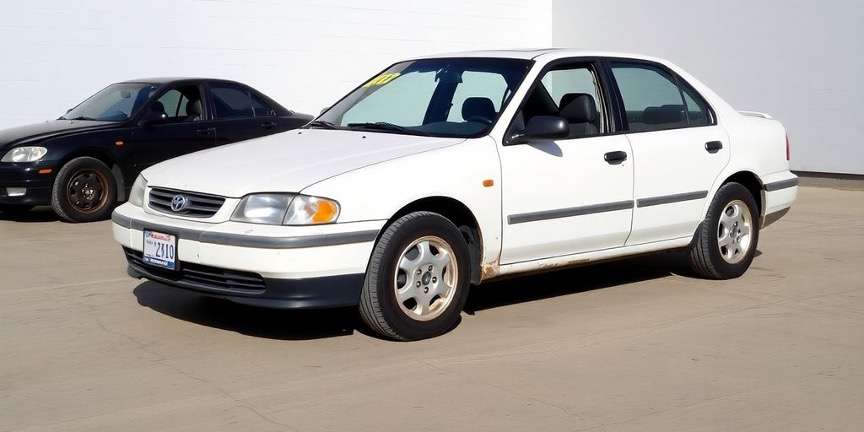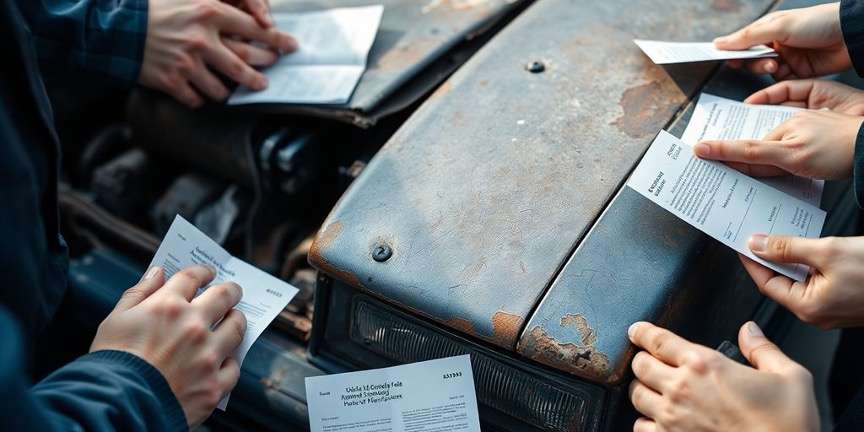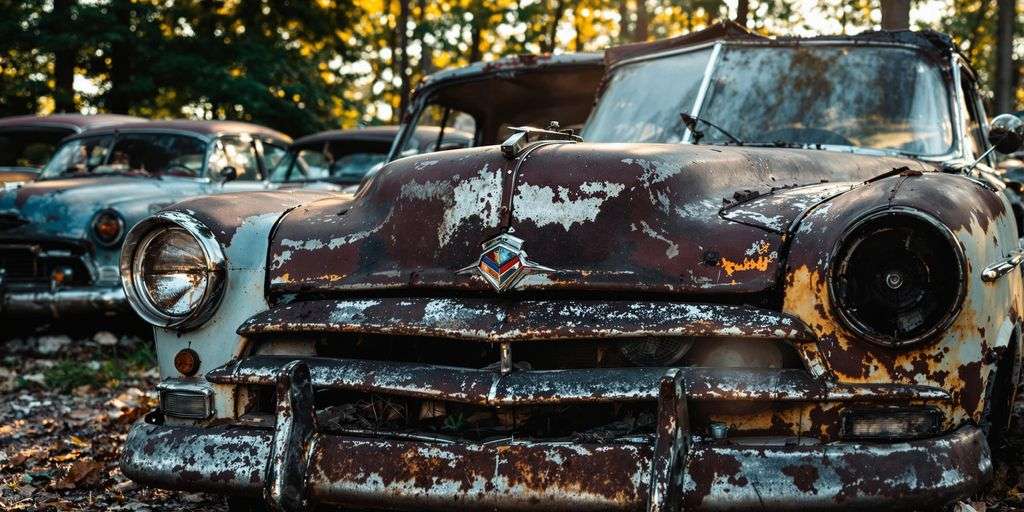Key Takeaways
- Understand the factors that influence your junk car's value, such as weight and usable parts.
- Always gather and compare multiple offers to ensure you're getting the best deal.
- Ask potential buyers about free towing and payment terms to avoid hidden costs.
- Negotiate confidently; don't be afraid to ask for a better offer if the initial one seems low.
- Prepare your car for sale by cleaning it out and gathering all necessary documents.
Understanding the Value of Your Junk Car
Factors That Influence the Offer
When you're trying to sell your junk car, it's important to know what affects its price. The car’s condition is a big deal—is it running, or is it just a heap of metal? Other things like the car’s year, make, model, and even its trim can change what buyers are willing to pay. The value of a junk car is primarily influenced by its overall condition, including whether it is operational or completely inoperable. Some cars are just worth more because they can be salvaged for parts or even exported if they're in decent shape. So, be upfront about your car’s mileage and any damage it might have. This honesty can really help you get a better offer.
How to Use Online Calculators
Online calculators are a handy tool to figure out your car’s worth without much hassle. These calculators consider stuff like the car’s age, condition, and mileage. You just punch in the details, and bam, you get a rough estimate of what you might get. It’s super convenient because you can do it all from your couch, no need to drive around to different places. Just be sure to give accurate info to get the best estimate.
Why Market Trends Matter
The market for junk cars isn’t static—it changes with trends, especially the price of scrap metal. If scrap prices are up, you might get a better deal. Also, if there’s a demand for parts from your specific car model, that could bump up the offer too. Keeping an eye on these trends can help you decide when to sell. Sometimes waiting a bit can mean more money in your pocket. So, always ask potential buyers how they calculate their offer. It could be based on weight, parts, or just the overall condition of your car.
Gathering Multiple Offers for Your Junk Car
Requesting Online Quotes
First things first, hop online and start gathering quotes from different buyers. This step is key because it gives you a ballpark figure of what your junk car might fetch. There are tons of websites that let you input your car's details and get an estimate. But don't just stop at one or two. Get at least three quotes to compare.
Here's how to do it:
- Visit multiple websites: Use sites that specialize in junk car sales, and enter your car's make, model, year, and condition.
- Be honest about the condition: If your car's got a busted engine or is missing parts, say so. It'll save you headaches later.
- Note the offer details: Some sites might offer immediate quotes, while others might take a day or two.
Comparing Offers from Different Buyers
Once you've got a handful of quotes, it's time to compare them. Don't just look at the dollar amount. Some buyers might offer more, but charge for towing, which can eat into your profits.
Consider these factors:
- Towing fees: Is it free, or do you have to pay?
- Payment terms: Do they pay cash on pickup, or is there a delay?
- Reputation: Check reviews to see if past sellers had good experiences.
Evaluating Buyer Credibility
Not all buyers are created equal. Some might promise the moon but deliver peanuts.
Here's how to spot a credible buyer:
- Check online reviews: Look for feedback from other sellers. A quick search can reveal a lot.
- Ask questions: Don’t hesitate to ask how they calculate their offers. Is it based on weight, parts, or overall condition?
- Look for red flags: Be wary of buyers who refuse to give clear answers or pressure you to make a quick decision.
Getting multiple offers isn't just about finding the highest bidder. It's about ensuring you're dealing with someone trustworthy who'll follow through on their promise. Take your time, do your research, and you'll get the best deal possible for your junk car.
Questions to Ask Potential Buyers
Is Free Towing Included?
One of the first questions to tackle is whether free towing is part of the deal. Hidden costs like towing can eat into your payment, leaving you with less cash than expected. Make sure to ask, “Is free towing included, or do I need to arrange it myself?” If a buyer doesn't offer this, it might be worth looking elsewhere. Free towing simplifies the process and saves money.
- Confirm if the towing service is free.
- Ask if the driver will bring the cash or check when picking up your vehicle.
- Verify any conditions where towing might incur a fee.
When Will I Receive Payment?
Getting paid promptly is crucial when selling your junk car. You don't want to hand over your vehicle only to face delays or uncertainties about payment. Ask potential buyers, “Do you pay on the spot, or is payment processed after the car is picked up?” Most reputable buyers will pay you at the time of pickup, either in cash or by check.
- Confirm the payment method in advance.
- Double-check the agreed amount before handing over the keys.
- Be wary of buyers who promise payment later or suggest wiring the money.
Is the Offer Final or Subject to Inspection?
It's frustrating to get a good quote only to have it slashed after the buyer sees the car. To avoid surprises, ask, “Will the quote change upon pickup or inspection?” Many buyers provide an initial estimate based on your description, but they might adjust it after seeing the vehicle.
- Be honest about your car’s condition when requesting a quote.
- Clarify any conditions that could lead to changes in the offer.
- Request a written guarantee of the quoted price.
Knowing whether the offer is final gives you peace of mind, making the selling process stress-free.
Negotiating the Best Deal for Your Junk Car
How to Negotiate Offers
When you’ve got a few offers lined up for your junk car, it’s time to put on your negotiation hat. Start by knowing the value of your car. This gives you a solid ground to stand on when discussing prices. Don’t be shy about mentioning other offers you've received. Let buyers know you’re shopping around. This can sometimes nudge them to up their bid. Keep it friendly but firm.
What to Do If the Offer Seems Low
If you get an offer that seems too low, don’t just accept it right away. Ask the buyer how they came up with that number. Sometimes, just questioning their logic can make them reconsider. If they stick to their guns, you might want to mention negotiating with multiple buyers to see if they’ll budge. Remember, you’ve got options, and walking away is one of them.
Ensuring a Written Guarantee
Before you finalize anything, make sure you get the offer in writing. This is especially important if you’ve negotiated a higher price. A written guarantee protects you from any last-minute changes. It’s also a good idea to have all the details of the transaction laid out, like the payment method and pickup arrangements. This way, there are no surprises when the deal goes through.
Getting the best deal for your junk car isn’t just about the money. It’s about feeling confident and satisfied with the transaction. Take your time, ask questions, and don’t settle for less than what feels right.
Preparing Your Junk Car for Sale

Cleaning Out Personal Belongings
Before you even think about selling, take a good look inside your car. Empty it out completely. You'd be surprised at what you might find under the seats or in the glove box. Remove all personal items, like sunglasses, CDs, or even that loose change. If you've added any aftermarket parts, like a fancy stereo or GPS, consider taking those out too. They could be worth selling separately. And remember, anything left behind might just end up in the trash.
Taking Photos to Maximize Value
Now, grab your phone or camera. Take clear, well-lit pictures from different angles. Snap shots of the exterior, interior, and under the hood. Don't forget any damage or rust spots—buyers appreciate honesty. Good photos can really help you get the best value for your junk car. They show buyers exactly what they're dealing with, and you might just get a better offer.
Gathering Necessary Documentation
Paperwork might not be thrilling, but it's a must. Find your car's title, registration, and any service records you have. If your title's missing, check with your local DMV about getting a replacement. Having everything ready speeds up the sale process. Plus, it reassures buyers that you're legit. Once you have all the documents, you're one step closer to sealing the deal.
Selling a junk car isn't just about getting rid of an old vehicle. It's about making sure you're ready to make the most of the sale. By prepping your car properly, you set yourself up for a smoother, more profitable transaction.
Finalizing the Sale of Your Junk Car

Transferring the Title Properly
Before you hand over your junk car, make sure the title is ready to go. The title is your proof of ownership, and without it, the sale can’t officially happen. If you’ve misplaced it, check with your local DMV about getting a duplicate. When you’ve got it, sign it over to the buyer. This step is crucial because it legally shifts ownership and any related responsibilities to them. Don’t forget to keep a copy for your records, just in case.
Understanding Payment Methods
Knowing how you’ll get paid is a big deal. Cash is straightforward, but some buyers might offer a check or even a bank transfer. Be cautious with checks—make sure they’re from a reputable buyer to avoid bouncing issues. If you’re getting a bank transfer, double-check the details with your bank to ensure everything is set up correctly. Getting paid promptly and securely gives you peace of mind and ensures a smooth transaction.
Arranging for Car Pickup
Once the paperwork is done and payment is sorted, it’s time to set up the car pickup. Most buyers will offer to tow your car for free, but it’s good to confirm this. Pick a time that works for both of you, and make sure you’ve cleared out all your personal items from the car. It’s also wise to remove any aftermarket parts you might want to keep or sell separately. When the tow truck arrives, double-check that all paperwork is complete and that you’ve received your payment before the car is taken away.
Finalizing the sale of your junk car can feel like a weight off your shoulders. With the title transferred, payment received, and the car picked up, you can finally say goodbye to that old clunker, knowing you’ve done everything by the book.
What Happens After You Sell Your Junk Car
Recycling and Environmental Impact
Once your junk car is out of your hands, you might wonder what happens next. Well, many buyers focus on recycling. Most parts of a junk car can be recycled, reducing waste and supporting a more sustainable auto industry. The metal is often melted down and reused, while fluids are disposed of safely. This process not only helps the environment but also supports the economy by providing materials for new products.
Reselling Usable Parts
Not every part of your junk car is destined for the recycling bin. Some components, like engines or transmissions, might still have some life left in them and can be resold. Buyers strip these parts and sell them to those in need of affordable replacements. This is a win-win, as it gives car owners access to cheaper parts while ensuring that your old car continues to serve a purpose.
Understanding the Buyer’s Process
Different buyers have different methods for handling junk cars. Some focus on recycling, while others might prioritize reselling usable parts. It's a good idea to ask your buyer what their process involves. Are they going to strip the car for parts, recycle the materials, or perhaps do a bit of both? Knowing this can help you choose a buyer whose methods align with your values, especially if you're concerned about environmental impact.
After selling your junk car, it’s reassuring to know it’s being handled responsibly, whether it’s through recycling or part reselling. This ensures that even though your car’s road days are over, it still contributes positively to the environment and economy.
Wrapping It Up: Making the Most of Your Junk Car Sale
So, there you have it! Selling your junk car doesn't have to be a headache. By checking out different offers and asking the right questions, you can make sure you're getting a good deal. Remember to ask about how they calculate the offer, whether they include free towing, and when you'll get paid. It's all about being prepared and knowing what to expect. Don't rush into the first offer you get—take your time to compare and choose the one that works best for you. And hey, once it's all done, you can enjoy that extra cash and maybe even clear up some space in your driveway. Good luck!
Frequently Asked Questions
How do buyers decide how much my junk car is worth?
Buyers look at different things like how heavy your car is, if any parts still work, and what the market wants right now. It's a good idea to ask them how they figured out the price.
Do I get paid right away when I sell my junk car?
Most good buyers will pay you when they come to get your car. They might pay in cash or with a check. Be careful if someone says they'll pay later, as it might be a scam.
Is towing my junk car free, or do I have to pay for it?
Many buyers will tow your car for free. Make sure to ask if towing is included so you don't end up paying extra.
What papers do I need to sell my junk car?
Usually, you'll need the car's title to sell it. Some places might accept other papers like a bill of sale. If you lost the title, ask the buyer what you should do.
Will the offer change after the buyer sees my car?
Some buyers might lower the offer if your car isn't as described. It's best to be honest about your car's condition and ask if the offer is final.
What happens to my car after I sell it?
After you sell it, the buyer might take parts to sell, recycle the metal, or do both. If you care about the environment, ask what they plan to do with your car.



